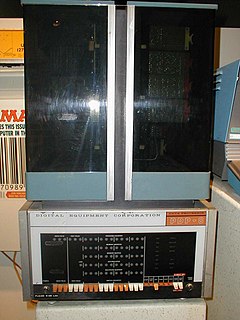Related Research Articles

A minicomputer, or colloquially mini, is a class of smaller general purpose computers that developed in the mid-1960s and sold for much less than mainframe and mid-size computers from IBM and its direct competitors. In a 1970 survey, The New York Times suggested a consensus definition of a minicomputer as a machine costing less than US$25,000, with an input-output device such as a teleprinter and at least four thousand words of memory, that is capable of running programs in a higher level language, such as Fortran or BASIC.

A magazine is a periodical publication, generally published on a regular schedule, containing a variety of content. They are generally financed by advertising, by a purchase price, by prepaid subscriptions, or by a combination of the three.
Computer magazines are about computers and related subjects, such as networking and the Internet. Most computer magazines offer advice, some offer programming tutorials, reviews of the latest technologies, and advertisements.

Dr. Dobb's Journal (DDJ) was a monthly magazine published in the United States by UBM Technology Group, part of UBM. It covered topics aimed at computer programmers. When launched in 1976, DDJ was the first regular periodical focused on microcomputer software, rather than hardware. In its last years of publication, it was distributed as a PDF monthly, although the principal delivery of Dr. Dobb's content was through the magazine's website. Publication ceased at the end of 2014, with the archived website continuing to be available online.

The Kansas City standard (KCS), or Byte standard, is a way of storing digital data on standard cassette tapes at a data rate of 300 bits per second. It originated in a symposium sponsored by Byte magazine in November 1975 in Kansas City, Missouri to develop a standard for the storage of digital microcomputer data on inexpensive consumer quality cassettes. The first systems based on the standard appeared in 1976.

MicroProse is an American video game publisher and developer founded by Bill Stealey and Sid Meier in 1982. It developed and published numerous games, including starting the Civilization and X-COM series. Most of their internally developed titles were vehicle simulation and strategy games.
LexisNexis is a corporation that sells data mining platforms through online portals, computer-assisted legal research (CALR) and information about vast swaths of consumers around the world. During the 1970s, LexisNexis began to make legal and journalistic documents more accessible electronically. As of 2006, the company had the world's largest electronic database for legal and public-records–related information.
Condé Nast is a global mass media company founded in 1909 by Condé Montrose Nast, and owned by Advance Publications. Its headquarters are located at One World Trade Center in New York City and the Adelphi building in London.
1988 saw many sequels and prequels in video games, such as Dragon Quest III, Super Contra, Super Mario Bros 2, Mega Man 2, Double Dragon II: The Revenge, and Super Mario Bros 3, along with new titles such as Assault, Altered Beast, Capcom Bowling, Ninja Gaiden, RoboCop, Winning Run and Chase H.Q.

Computerworld is an ongoing decades old professional publication which in 2014 "went digital." Its audience is information technology (IT) and business technology professionals, and is available via a publication website and as a digital magazine.
Zenith Data Systems (ZDS) was a division of Zenith Electronics founded in 1979 after Zenith acquired Heathkit, which had entered the personal computer market in 1977. Headquartered in Benton Harbor, Michigan, Zenith sold personal computers under both the Heath/Zenith and Zenith Data Systems names.

Prentice Hall is an American major educational publisher owned by Savvas Learning Company. Prentice Hall publishes print and digital content for the 6–12 and higher-education market. Prentice Hall distributes its technical titles through the Safari Books Online e-reference service.

Periodical literature is a category of serial publications that appear in a new edition on a regular schedule. The most familiar example is the magazine, typically published weekly, monthly, or quarterly. Other examples of periodicals are newsletters, academic journals and yearbooks. Newspapers, often published daily or weekly, are, strictly speaking, a separate category of serial. Periodicals are most often referenced by volume and issue. Periodicals have a set period and can be classified as popular and scholarly. Indefinite periodicals have an indefinite production cycle and have no plans to stop publishing. Periodicals use the International Standard Serial Numbers a standardized reference number. Periodicals often have a preferred and lower rate for postal distribution.
This article presents a timeline of events in the history of 16-bit x86 DOS-family disk operating systems from 1980 to 2020. Non-x86 operating systems named "DOS" are not part of the scope of this timeline.

Variety is an American media company owned by Penske Media Corporation. The company was founded by Sime Silverman in New York City in 1905 as a weekly newspaper reporting on theater and vaudeville. In 1933 it added Daily Variety, based in Los Angeles, to cover the motion-picture industry. Variety.com features breaking entertainment news, reviews, box office results, cover stories, videos, photo galleries and features, plus a credits database, production charts and calendar, with archive content dating back to 1905.
The United Kingdom is Europe's second largest video game market after Germany, and the sixth largest in the world. The UK video game market was worth £5.7 billion in 2018, a 10% increase over the previous year.
The 1980s was the second decade in the industry's history. It was a decade of highs and lows for video games. The decade began amidst a boom in the arcade business with giants like Atari still dominating the market since the late-1970s. Another, the rising influence of the home computer, and a lack of quality in the games themselves lead to an implosion of the video game market that nearly destroyed the industry. It took home consoles years to recover from the crash, but Nintendo filled in the void with its Nintendo Entertainment System (NES), reviving interest in consoles. Up until this point, most investors believed video games to be a fad that has since passed. In the remaining years of the decade, Sega ignites a console war with Nintendo, developers that had been affected by the crash experimented with the more advanced graphics of the PC, and Nintendo released the Game Boy, which would become the best-selling handheld gaming device for the next two-decades.

Tramways & Urban Transit(TAUT or T&UT), also known as Modern Tramway, is a British monthly magazine about tramways and light rail transport, published continuously since 1938. Its content is orientated both to tramway enthusiasts and to persons working in the tram transport field or studying tramways. It has been issued monthly from the beginning. Although published in Britain, the magazine's coverage is international, and its regular "World News" column includes detailed news on electric trams and light rail worldwide.

Byte was a microcomputer magazine, influential in the late 1970s and throughout the 1980s because of its wide-ranging editorial coverage.
Systime Computers Ltd was a British computer manufacturer and systems integrator of the 1970s and 1980s. During the late 1970s and early 1980s, Systime become the second largest British manufacturer of computers, specializing in the minicomputer market.
References
- ↑ Michael S. Malone (January 10, 1982). "News From Silicon Valley: The Winchester Drive". The New York Times .
Mini-Micro Systems, a computer trade magazine
- 1 2 N. R. Kleinfield (August 29, 1981). "Computing's Lusty Offspring". The New York Times .
- ↑ Geraldine Fabrikant (July 14, 1987). "Publisher To Acquire Variety". The New York Times .
- ↑ "Advertising: People". The New York Times . January 29, 1987.
publisher of Mini-Micro Systems magazine.
- ↑ "M Geller Computer" (PDF). Computer History Museum .
Folder 12 ... Mini-Micro Systems
- ↑ "Mini-Micro Systems".
- ↑ "Mini-Micro Systems" . Retrieved July 14, 2021.
- ↑ "S. SACKS Obituary (1928 - 2019)".
President and Publisher of Mini-Micro Systems (formerly Modern Data)
- ↑ "Texas Instruments news from Mini-Micro Systems Mag". Atari Age .
- ↑ "Mini-Micro Systems (Magazine or Journal)". Malden Public Library. ISSN 0364-9342.
1976-1989